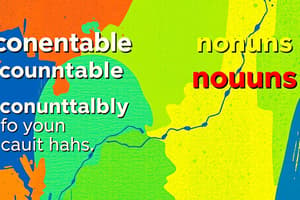Podcast
Questions and Answers
Which of the following represents an uncountable noun?
Which of the following represents an uncountable noun?
What type of noun is 'happiness' classified as?
What type of noun is 'happiness' classified as?
Which of the following includes only countable nouns?
Which of the following includes only countable nouns?
Identify the correct pair of a countable and an uncountable noun.
Identify the correct pair of a countable and an uncountable noun.
Signup and view all the answers
Which statement correctly describes countable nouns?
Which statement correctly describes countable nouns?
Signup and view all the answers
Which of the following nouns has an irregular plural form?
Which of the following nouns has an irregular plural form?
Signup and view all the answers
What determiner can be used with singular countable nouns?
What determiner can be used with singular countable nouns?
Signup and view all the answers
Which quantifier indicates an indefinite amount but more than zero?
Which quantifier indicates an indefinite amount but more than zero?
Signup and view all the answers
Which of the following nouns forms its plural by adding -es?
Which of the following nouns forms its plural by adding -es?
Signup and view all the answers
In which context is 'any' appropriately used?
In which context is 'any' appropriately used?
Signup and view all the answers
What option correctly describes the meaning of 'plenty of'?
What option correctly describes the meaning of 'plenty of'?
Signup and view all the answers
Which quantifier implies 'almost none'?
Which quantifier implies 'almost none'?
Signup and view all the answers
Which of the following examples is an uncountable noun?
Which of the following examples is an uncountable noun?
Signup and view all the answers
What distinguishes countable nouns from uncountable nouns?
What distinguishes countable nouns from uncountable nouns?
Signup and view all the answers
In which context can the noun 'hair' be considered countable?
In which context can the noun 'hair' be considered countable?
Signup and view all the answers
Which of the following is not classified as an uncountable noun?
Which of the following is not classified as an uncountable noun?
Signup and view all the answers
What is a common way to form the plural of countable nouns?
What is a common way to form the plural of countable nouns?
Signup and view all the answers
Which of these is an example of an abstract uncountable noun?
Which of these is an example of an abstract uncountable noun?
Signup and view all the answers
How should 'information' be classified?
How should 'information' be classified?
Signup and view all the answers
Which noun typically takes a plural form?
Which noun typically takes a plural form?
Signup and view all the answers
Study Notes
Countable and Uncountable Nouns
- Nouns represent people, places, things, or ideas.
- Nouns are categorized into countable and uncountable types.
- Countable nouns can be counted (e.g., one apple, two cars).
- Uncountable nouns cannot be counted (e.g., water, air).
Countable Nouns
- Represent individual objects that can be counted
- Examples include chair, table, book, pencil, car, house, flower, computer, phone, shirt, shoe, key, door, window, bag, plate, fork, knife, spoon, glass, cup.
- Examples include student, teacher, doctor, nurse, friend, cat, dog, bird, fish, insect, lion, elephant, monkey, bear, zebra, giraffe.
- Examples involve city, town, village, country, island, mountain, river, lake, ocean, park, museum, library, school, hospital, restaurant, store.
- Examples include idea, suggestion, problem, question, decision, choice, opportunity, challenge, goal, plan, rule, law, theory, experiment.
Uncountable Nouns
- Represent substances, concepts, or qualities that cannot be broken into individual units.
- Examples include water, air, happiness, information.
- Examples include rice, water, milk, coffee, tea, sugar, salt, pepper, bread, meat, cheese, fruit, vegetables, advice, information, news, research, evidence, homework, luggage, money, furniture, equipment, jewelry.
- Examples include time, space, knowledge, happiness, beauty, love, anger, music, art, literature, weather, nature, progress, pollution, research, technology, electricity, gas, light, heat.
- Examples include wood, paper, plastic, metal, glass, cotton, leather, silk, wool, gold, silver, oil, paint, air, soil, sand, dust, smoke, rain, snow.
- Examples include progress, advice, luggage, traffic, furniture, news, research, information, accommodation, chaos, damage, entertainment, equipment, evidence, homework, knowledge, permission, progress, research, scenery, traffic, travel, work, weather.
Distinguishing Countable and Uncountable Nouns
- Countable nouns have singular and plural forms (e.g., book/books).
- Uncountable nouns typically have only one form and don't have plurals (e.g., water).
- Context is important in determining a noun's countability (e.g., "hair" is typically uncountable, but "hairs" can be used in certain contexts).
Singular and Plural Forms
- Most countable nouns form plurals by adding "-s" (e.g., book/books, cat/cats).
- Some nouns form plurals by adding "-es" (e.g., bus/buses).
- Certain nouns have irregular plural forms (e.g., child/children).
Determiners
- A/an are used with singular countable nouns.
- The is used with both singular and plural countable nouns and uncountable nouns (referring to specific items or concepts).
- Some is used with both plural countable nouns and uncountable nouns.
- Any is used with both plural countable nouns and uncountable nouns in negative sentences or questions
Quantifiers for Uncountable Nouns
- Quantifiers are specific words used to express the quantity of uncountable nouns.
- Examples include some, any, much, a lot of, a little, little, plenty of, enough.
Conversion Between Countable and Uncountable Nouns
- Some nouns can shift between countable and uncountable forms depending on the context (e.g., "work," "hair").
- The context changes the meaning.
Challenging Cases
- Certain nouns function as both countable and uncountable, depending on context (e.g., "work," "hair").
- The use of determiners and quantifiers helps differentiate between these forms.
Conclusion
- Understanding the difference between countable and uncountable nouns is crucial for accurate grammar and communication.
- The forms of the noun indicate whether something is singular or plural.
- The use of articles, determiners, and quantifiers helps clarify the meaning.
Studying That Suits You
Use AI to generate personalized quizzes and flashcards to suit your learning preferences.
Related Documents
Description
Test your understanding of countable and uncountable nouns with this quiz. Learn to differentiate between nouns that can be counted and those that cannot. Get ready to enhance your grammar skills and expand your vocabulary!




